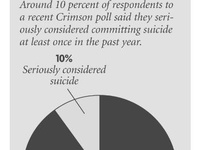“As soon as I suggested I wanted to leave, she was like, ‘Go!’” Whitman says. “She didn’t give it a second thought…. I feel like they’re really fast to have you leave if you’re going to be a problem.”
Whitman says that clinicians at UHS encouraged her to take time off from school as well.
She attributes this attitude to a desire by UHS to protect Harvard’s liability in the event that she hurt herself.
“They have to keep Harvard’s liability in the back of their mind whenever they’re seeing you,” Whitman says. “I feel like they were quicker to encourage me to leave because I might have been a bigger liability to them if I did something to myself while I stayed.”
Peter F. Lake ’81, a professor of law at Stetson University in Florida who has published a book on university legal obligations, says that nudging students off campus is one way universities currently deal with the burgeoning mental health “crisis” on campuses.
“There’s a number of approaches to the first generation of the problem, and one thing is to push the problem off campus,” Lake says. “It may not be the best thing for them or the school, but it’s one solution to the campus issue.”
Hyman says that liability is always a concern for medical institutions because of the number of lawsuits filed by patients.
“Of course everyone in the world of medicine thinks about being sued because it’s just part of the ethos that makes people defensive,” Hyman says. “But if you practice really good clinical care, I think that’s all that can be asked of you.”
While Kadison says he thinks administrators sometimes worry about the liability of the College if troubled students hurt other students, he says concern over liability is never a major factor when the College asks a student with mental health problems to take a leave of absence.
“There are some concerns about liability in dorms here, but I can’t think of a time that students [have] had to leave because people are afraid they’re going to hurt themselves,” Kadison says.
Lake says it is fairly common for universities to push mentally ill students off campus in order to avoid murky legal issues.
While Siegel says liability should not be a top concern for universities, he says he thinks some universities probably do try to push students with mental health problems off campus to avoid lawsuits.
“There are so many opportunities to be sued,” he says.
According to former Dean of the College Harry R. Lewis ’68, the College should be concerned about another type of liability if administrators want to take a more aggressive line in removing students with mental illness who are struggling academically.
“As for whether we should be less accommodating to mental illnesses and allow students to flunk out instead of just hanging on, I should think you would want to consult legal counsel before heading in that direction, mental illnesses being something for which we are required by law to provide accommodations, under [the Americans with Disabilities Act],” Lewis wrote in an e-mail response to Ceder’s and Summers’ discussion.
Read more in News
Chapel May Remain in Cambridge Permanently















